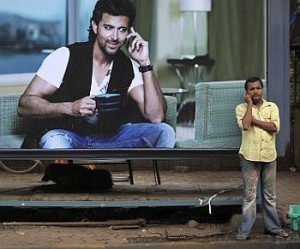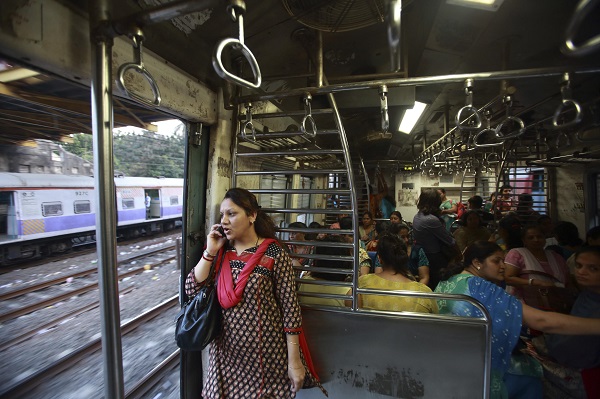Clearly, there’s nothing we need in Mumbai, including friends and family, if we have a m0bile phone in our hands.
 by Dr Pooja Birwatkar
by Dr Pooja Birwatkar
New to travelling in the local trains of Mumbai, I was slowly beginning to learn the basics of acceptable train behaviour. I started out with buying a first class pass, but I would travel by second class because many people scared me about how unsafe travelling alone in the ladies first class compartment was (even though most of these ‘advisors’ seldom travelled by train).
But my time with the second class convinced me to take the first class coach even if I was alone in it, which was seldom, because the city’s population won’t allow for empty coaches.
In the first few days, I found myself looking at the women travelling with me. And very soon, I found the fashionably-dressed women giving me strange looks. I realised what the problem was – I was probably the only person travelling sans ear plugs connected to a music player or a fancy phone, and not staring at my mobile phone.
Having been a psychology student, it had become a habit for me to observe people and study their mannerisms. But I had to train myself to not stare, so, I learnt to observe them slyly. And almost always, this is what I found: 90 per cent commuters are hooked to their phones, while the rest sleep or chat with their friends.
Isn’t it awesome, this technology that allows us to chat with our friends and associates at all times of the day? You are no longer alone if you have a phone in your hands – not even  when you’re physically alone in a coffee shop. A few years ago, one would feel uncomfortable waiting alone at a bus stop or a train platform, or even in a restaurant. But our phones, in front of our eyes at all times, divert us so well, we don’t even feel alone despite being alone. Our phones help us escape feelings of awkwardness in public spaces, and keep us so occupied, we hardly know who is sitting next to us.
when you’re physically alone in a coffee shop. A few years ago, one would feel uncomfortable waiting alone at a bus stop or a train platform, or even in a restaurant. But our phones, in front of our eyes at all times, divert us so well, we don’t even feel alone despite being alone. Our phones help us escape feelings of awkwardness in public spaces, and keep us so occupied, we hardly know who is sitting next to us.
But you know what? I miss the times when journeys were times when we smiled at our fellow passengers, had a few casual talks, and sometimes made great friendships with the mothers of cute babies travelling with us. I can only vaguely remember the simpler times when social networking did not dictate our first actions for the day and the last things we did at night. I sometimes brush my teeth in the morning with my eyes glued to my cell phone.
People have also found ways to scare us into forwarding certain messages to a fixed number of people or incur the wrath of some God (who, I suppose, has cracked a way to keep a tab on the forwarded messages and do calculations of who followed instructions and who didn’t).
Unlike a lot of people who constantly berate technology for reducing human interaction, I am not going to say that social networking is totally unnecessary – after all, it does help unite us with people we knew ages ago, and it helps us keep in touch with everything in a rapidly shrinking world. It gives us a daily insight into how others we know are living their lives – and sometimes makes us believe they’re having more fun than we are.
I admit I love secretly peeping into other people’s lives. If we had this level of communication growing up, we wouldn’t have to contend with coy glances at our crushes in our teenage years. We would wait for the other person to make a move (which never happened), and all we would be left with would be fond memories. Imagine now, if you had a crush on somebody, all you had to do was write a smartly-worded message and send it to the person, thereby saving yourself from potentially embarrassing moments.
And yet, a part of me wants to take the time out to actually talk to others, rather than type to them. It is indeed sad that we are forgetting to even make small talk when we do happen to meet people. The other day, a friend of mine said that when she meets her parents on her visits to India, she struggles to find topics of conversation. It is also distressing to observe grandparents or parents in parks blissfully unaware of what their little wards are up to, because they are so busy tapping away at their phones.
With every revolution comes a change in our social patterns, and it takes a while to accept these changes. Funnily enough, I am writing this article on my cell phone in a local train. Who would have thought this was possible a few years ago? Once I am done writing, I am going to plug in my earphones and browse through my phone, not looking left or right. And it gives me a little thrill to know that I have been writing about my co-passengers and the local train, and they have no idea.
Dr Pooja Birwatkar is currently pursuing post doctoral research and working in the area of science education. She has been associated with the field of education in the past as a teacher educator, and her area of interest is research in education.





